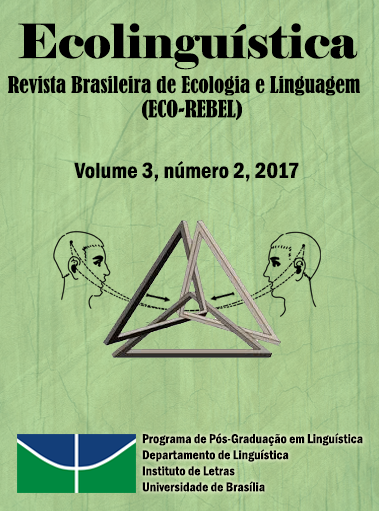A biolinguística e a capacidade humana
Mots-clés :
iolinguística; faculdade da linguagem; arquitetura mental da linguagem.Résumé
perspectiva biolinguística atualiza abordagens que remontam à tradição filosófica aristotélica, em relação ao que foi posteriormente interpretado como entidades mentais. Nesse sentido, a língua de um indivíduo é vista em todos os seus aspectos ”“ som, significado, estrutura ”“ como um estado de algum componente da mente, que se manifesta por intermédio das estruturas do cérebro, como atributo inato, resultante da evolução biológica do ser humano. De acordo essa abordagem, a língua é um estado da faculdade de linguagem ”“ “uma língua-I no uso técnico, em que “I” põe em destaque o fato de que a concepção é internalista, individual, e intensional (com “s”, não com “c”) ”“ ou seja, a real formulação dos princípios gerativos, não o conjunto por ele enumerado; este último pode ser visto como uma propriedade mais abstrata da língua-I(nterna), assim como podemos pensar no conjunto de trajetórias possíveis de um cometa através do sistema solar como uma propriedade desse sistema”. A argumentação baseia-se na hipótese de que a faculdade de linguagem tem as propriedades gerais de outros sistemas biológicos, apontando-se três fatores que entram no desenvolvimento da linguagem no indivíduo, a saber: fatores genéticos, que determinam a manifestação do estado mental definido como Gramática Universal (GU), considerado o aparato responsável por interpretar a experiência linguística, no processo de aquisição da linguagem, o que resulta no desenvolvimento das línguas particulares; a experiência, que conduz à variação, em uma gama limitada de possibilidades; e princípios não específicos à faculdade de linguagem, que incluem princípios da arquitetura estrutural que determinam o caráter geral dos tipos de sistemas linguísticos que podem surgir.
Téléchargements
Téléchargements
Publié-e
Comment citer
Numéro
Rubrique
Licence
Autores que publicam nesta revista concordam com os seguintes termos:
Autores mantêm os direitos autorais e concedem à revista o direito de primeira publicação, sendo o trabalho simultaneamente licenciado sob a Creative Commons Attribution License o que permite o compartilhamento do trabalho com reconhecimento da autoria do trabalho e publicação inicial nesta revista.
Autores têm autorização para assumir contratos adicionais separadamente, para distribuição não exclusiva da versão do trabalho publicada nesta revista (ex.: publicar em repositório institucional ou como capítulo de livro), com reconhecimento de autoria e publicação inicial nesta revista.
Autores têm permissão e são estimulados a publicar e distribuir seu trabalho online (ex.: em repositórios institucionais ou na sua página pessoal) a qualquer ponto antes ou durante o processo editorial, já que isso pode gerar alterações produtivas, bem como aumentar o impacto e a citação do trabalho publicado (Veja O Efeito do Acesso Livre).



3.png)



